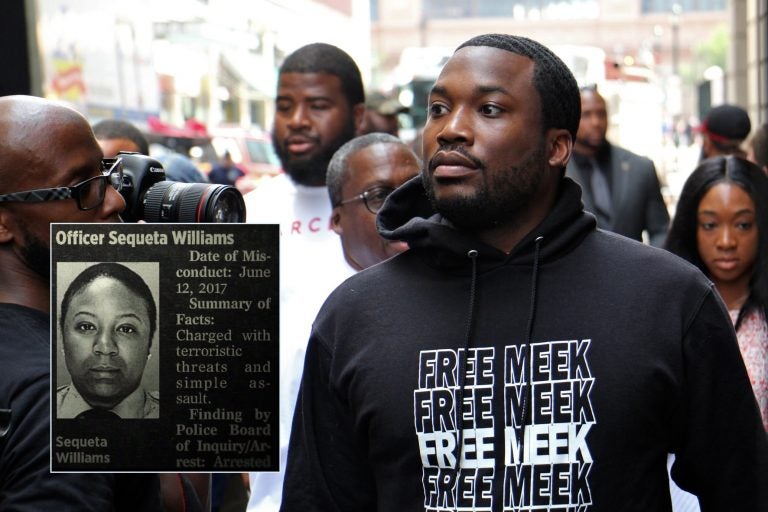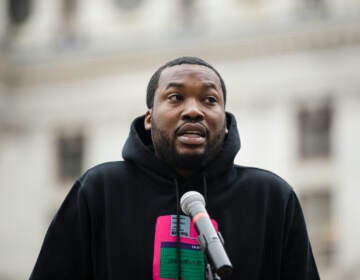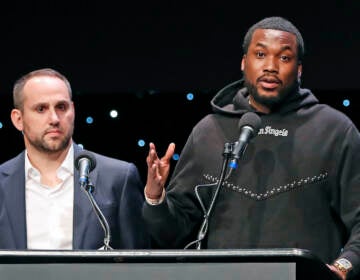An ex-Philly cop is suing Meek Mill, Jay-Z and Amazon for a few seconds on screen
Former Officer Saqueta Williams appeared in “Free Meek” because she’s on the DA’s “Do Not Call” list.

Rapper Meek Mill arrives at the Juanita Kidd Stout Center for Criminal Justice for a hearing. Hundreds of supporters filled the street outside the courthouse. (Inset: Screenshot from 'Free Meek' documentary on Amazon) (Emma Lee/WHYY)
A fired Philly cop is suing Meek Mill, Jay-Z, Amazon and others for defamation over a documentary that her lawyers say falsely implies she was corrupt and a liar.
The lawsuit, filed in federal court on Tuesday, centers on a few seconds in the Amazon Prime documentary series “Free Meek.” The five-part series chronicles problems within Philadelphia’s criminal justice system in light of the rapper’s probation troubles.
An image of former police officer Saqueta Williams is featured in an episode of the series: one that covers Philadelphia’s “Do Not Call” list. This informal index names more than 60 cops whom the district attorney’s office avoids summoning to testify in court, due to credibility issues.
Williams landed on the list after the department arrested her over an incident in which she drew a gun during an off-duty altercation outside of a North Philly bar. The former officer was later acquitted. Her attorneys now argue the documentary defamed her by featuring her likeness in the context of commentators describing the “Do Not Call” list as one enumerating “dirty” cops or those that had lied in court.
“It lends the impression to the ordinary person that she was a corrupt police officer. That she had lied or perjured herself, which is not true,” said Williams’ lawyer, Steven F. Marino. “That’s the foundation of the suit.”
Filed in the U.S. District Court for the Eastern District of Pennsylvania, the suit alleges that the A-List cast of defendants personally signed off and profited from the script — which for a few seconds included Williams.
Publicists for Meek Mill and Jay-Z declined to comment on Friday. Amazon did not respond to an email about the litigation.
Fired from PPD for drawing a gun at the bar
The “Do Not Call” list began under former DA Seth Williams and continues under DA Larry Krasner, who made officer names public in early 2017. That was the same year Meek Mill’s saga returned to public light, after he was sentenced to jail time over a probation violation.
It was also the year Williams and her significant other were involved in an early morning altercation with four women outside a bar on North Broad Street. The incident made its way back to the department, sparking a PPD Internal Affairs investigation. Williams was then arrested and fired from the force, but a jury acquitted her on all charges last February, according to the lawsuit. Williams’ attorney’s insists she drew her firearm on the crowd only “to deescalate the situation.”
Fast forward to August 2019, when “Free Meek” dropped on Amazon Prime.
The locally filmed series follows the eponymous rapper’s 12-year journey through the Philadelphia criminal justice system. The fourth episode, entitled “Filthadelphia,” explores several recent corruption scandals in the DA’s office and police department.
One of the topics discussed is the “Do Not Call” list — relevant because it includes the former police officer, Reginald Graham, who arrested Mill on his initial charges over a decade ago.
At one point, a Rolling Stone reporter describes the list as containing “dirty and dishonest cops.” According to the suit, this narration, along with the use of Williams’ image, “imputes the impression in the minds of the average persons among whom it is intended to circulate that…Williams was a dirty and dishonest police officer.”
However, that description comes shortly before Williams appears. Her departmental photo as printed in a 2018 Inquirer article about the list is shown as Philadelphia public defender Bradley Bridge describes the general purpose of index.
“The DA’s Office generated a specific list that has 66 names of police officers on it,” Bridge says in a voiceover. “There have been findings by the police department that the officers have lied to internal affairs, to other police officers, or in court.”
‘Inclusion on the list is factual and uncontested’
Bridge and his comments are mentioned in the suit, although he is not listed as a defendant. Reached by WHYY/Billy Penn on Friday, the public defender stuck by the documentary’s depiction.
“The inclusion on the list is factual and is uncontested, by Officer Williams, for example. She’s saying her inclusion on the list defamed her. She was charged with terroristic threats and simple assault. Her inclusion was a reflection of that fact,” he said. “The significance of it is a different question. The consequences are a different question.”
Williams’ lawyers disagree. Her inclusion in that scene suggests that “lied in court and committed the crime of perjury,” the suit alleges. The lawsuit claims Williams suffered harm to her reputation and emotional duress as a result, and asks for compensatory damages.
“The list differentiates the reasons why the police officers’ name appears on the list. Her name did not appear on the list because of any accusation that involved corruption, any accusations that involved falsehoods, or lying or deception,” attorney Marino told WHYY/Billy Penn on Friday. “It appears simply because she was charged with an offense she was eventually acquitted of.”
The lawsuit alleges that Meek, Jay-Z and other co-defendants personally “inspected and edited the script Season 1, Episode 4” prior to its broadcast. Roc Nation, the Jay-Z-founded company that produced the series, its distributor, Amazon.com, Inc., and Rolling Stone publisher Wenner Media are also listed as a defendant) are also named as defendants.
Bridge reiterated that these lists are a trade tool used by prosecutors in several cities beyond Philadelphia.
“This is common practice among prosecutors offices across the country, given their constitutional duty to provide this information to defense counsel so they can do what they’re supposed to do. This is the method for tracking [police],” he said. “If you accurately report that these people are on a list maintained by the DA’s office, that’s a factual statement.”
Out of a handful of other PPD officers whose images appear in the series, Williams is the only to file a lawsuit to date, court records indicate.
WHYY is your source for fact-based, in-depth journalism and information. As a nonprofit organization, we rely on financial support from readers like you. Please give today.






